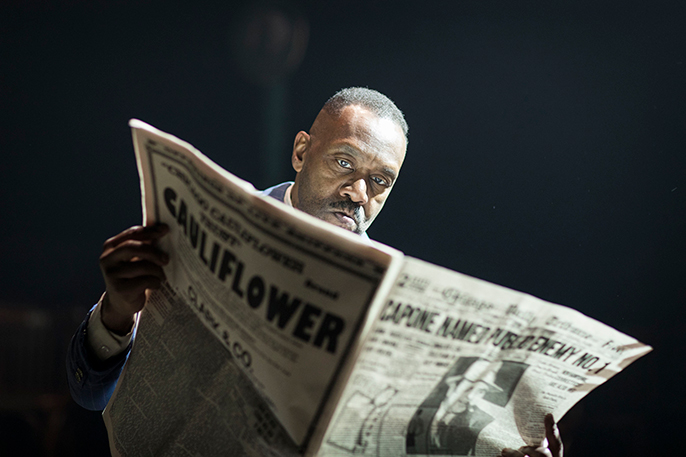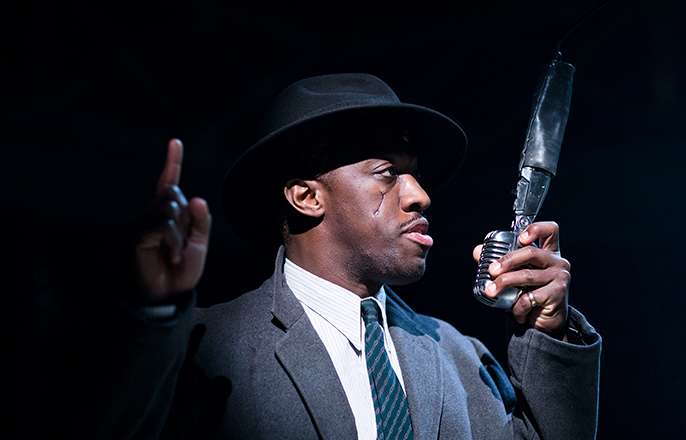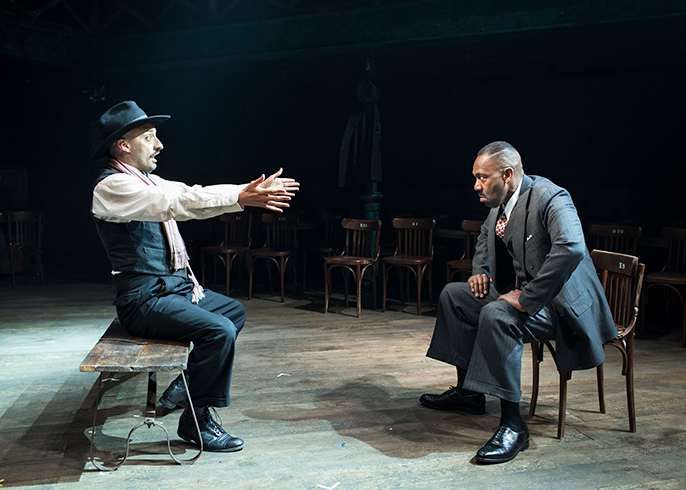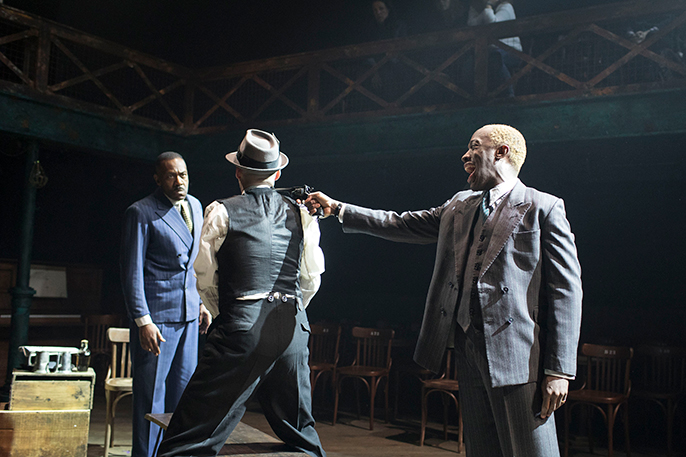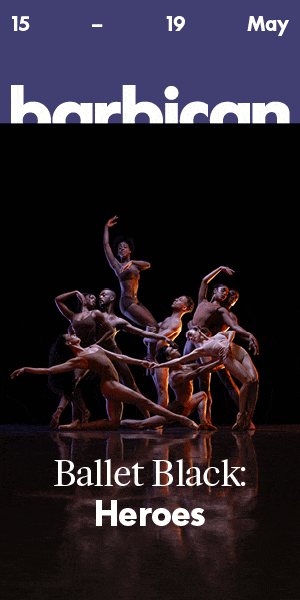The seating-plan in the traditional stalls area is set to resemble a 1930s Chicago bar (speakeasy). The performance starts before the official ‘lights up’, with a 1930s jazz soundtrack, and the cast – already in character – mingling with, and chatting to, the audience-members. This lets the audience know that anything might happen, and sets the tone for our constant participation throughout, leading to a handsome pay-off later on.
See listing for The Resistible Rise of Arturo Ui
The ‘show proper’ starts off with some syncopated hand clapping, before the “Announcer” (Tom Eddon) delivers a superb introductory speech. In it he outlines the story, introduces the main characters, and flippantly suggests that any resemblance the narrative might have to ‘real events’ is purely coincidental.
Lenny Henry performs with admirable focus and fearsome intensity.
The story starts with Chicago’s Cauliflower Union plotting to convince influential political figure, Alderman Dogborough (Michael Pennington), to confer his signature for a lucrative dock redevelopment scheme. Priding himself on his reputation for moral rectitude, the alderman initially rebuffs the bribe. However, after an appeal to both his working-class roots, and his vanity, he acquiesces; thus embroiling himself in a huge scandal, one that he may very well be indicted for.
Up steps Arturo Ui, an infamous gangster. He hears about Dogsborough’s problems and, after using his crime syndicate to help make both evidence and people appear or disappear as needed, he soon has his hands on cauliflower distribution throughout Chicago.
Fighting off criminal investigations, rival gangs and in-fighting within his own organization, Ui decides that a more clean-cut image might prove productive in order to further manipulate the media and ‘the people’.
So, in the play’s funniest sequence, he hires “Actor” (Eddon again) to help him walk, talk, and orate. The image-change, in conjunction with his bullyboy tactics and lying strategy, works perfectly and a new dictator is born.
The superb singing and acting of Giles Terera and Gloria Obianyo deserve mention, as does the scene-stealing Tom Edden.
Of course, the play was written with the German Nazi party in mind, but this production makes no attempt to disguise its critiquing of a certain American businessman-turned-politician; indeed, the entire cast constantly refer to many of Donald J. Trump’s tropes and quotes. It’s true, the constant Trump references do become a little repetitive and, added to an often-heightened acting style, this often leads the production ‘towards the broad’ (i.e. pantomime); almost, as if it’s constantly repeating: “He’s in front of you!” Still, it does so entertainingly.
Lenny Henry is good as the street-smart, rich, powerful and single-minded Ui. His performance brings to mind many on-screen gangster bosses, including Delroy Lindo in “Malcolm X”, and Harry Belafonte’s more stylised turn in “Uptown Saturday Night”. However, the somewhat broad nature of the character means that Henry’s charisma and often-underestimated ‘straight’ acting chops are somewhat subsumed. Ui is less a fully written character, than a ‘cautionary tale’; not quite the boogie man, but not too far off. Bearing this in mind, he performs with admirable focus and – when required – fearsome intensity.
But it’s certainly not a one-man show. In fact, the heavy lifting, singing, acting and playing is shared throughout the cast who – with a few exceptions – are each tasked to perform more than one role. In a great ensemble, it’s almost unfair to single anyone out. However, the superb singing and acting of Giles Terera and Gloria Obianyo deserve mention, as does the aforementioned, scene-stealing Tom Edden.
The production is staged superbly – the microphone suspended from the ceiling is a character by itself – and the cast members do the set/props ‘business’ well. The lighting and sound are excellent, as are the music choices (whether played live or via backing track). The device whereby cast members take turns to sing snippets of popular songs between scenes is particularly effective.
However, the surprise ‘star’ of the show is the audience, whose members are tasked with being – at various times – a corpse, a court defendant, and Ui’s criminal accomplices. It is near the story’s end, however, when Arturo Ui is poised to cement his political ascent, that this production plays its (sorry) trump card: a simple ‘opinion poll’ reminds us that we are all complicit in the system we live in/under. What we say (or not), and where we stand (or sit), can make a huge difference. In a sequence where the hitherto movable ‘fourth wall’ is removed altogether, we are given a choice: whether to remain in ‘the theatre’ of unfolding events, or to respond honestly to the weight of the evidence revealed. It is an intriguing, and timely, moment of narrative-led, interactive theatre; one for which adaptor Bruce Norris, and director Simon Evans are to be commended.
This Bertolt Brecht play – written in 1941, first performed in 1958, and set in 1930s Chicago – is an allegory about Adolf Hitler’s rise to power.
It is also a barely-disguised attack on Trump’s America, as well as other territories a little ‘closer to home’. As such, it’s (very) obviously trying to warn us that social progress needs to be backed up by constant vigilance, and that totalitarianism must be confronted with empathy, common purpose and unwavering bravery – both intellectual and physical.
If not quite a tour de force, this production mirrors our present-day tawdry farce, and delivers a challenge to us all: ‘Resist the rise…resist…resist.’

























